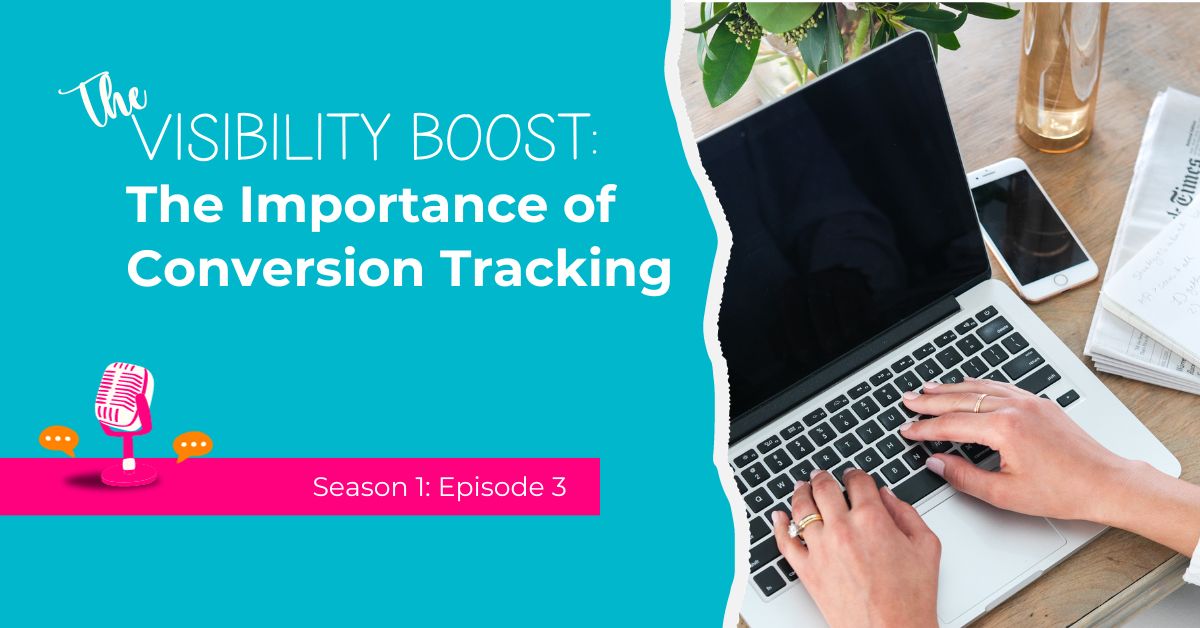So now you have people coming to your website and they're taking the actions that you want.
But you don't know where people actually came from.
You don't know the sources like Google or Facebook or Pinterest that led people to your website and led them to take an action. You have to have some data to look at in order to make data-driven marketing decisions. Welcome to The Visibility Boost. My name is Glenneth Reed and I'm going to be your host as we talk about why conversion tracking is so important.

The first thing you want to make sure is that you have Google Analytics installed on your website and that it is tracking data. This will not only tell you what source of traffic people are coming from organic, paid, social – it will tell you where they are in the world, what device they came in on, how long they stayed on your site, how many pages they visited, if they were engaged, et cetera. This data is what will allow you to ultimately make decisions about your marketing strategies.
Having Google Analytics will help you decide if your time, money and effort are being spent in the right place and on the right platforms. But first, you have to have this data.
Two of the conversions that I recommend everyone set up are having a thank you page for your contact form so that if somebody completes your contact form, instead of staying on that form page with successfully submitted or whatever message at the bottom it redirects to a thank you page where you can provide additional information to that person. But you have now tracked where that contact form originated from. Also for any kind of freebies that people may come on your website and give their name or email address should then redirect to a thank you page, where once again, you have an opportunity to provide them with more information or tell them what to do next, while you're gathering data about where they came from.
So now that you are tracking conversions now, what?
The first thing you can do is use it to make data-driven decisions. You can determine where your time, money and effort should be spent by seeing which sources or mediums are providing the most conversions.
If 90% of your conversions are coming from organic, but you're not spending any time, money or effort on optimizing your website or SEO; think what spending a little bit of your marketing budget on that could do for the increase in conversions.
Similarly, if you're running say Pinterest and Facebook Ads and Facebook is bringing you more significantly more conversions than Pinterest, maybe you want to stop running Pinterest ads and redirect that money into Facebook.
Being a small business, I understand we do not have unlimited funds. We can't just double or triple our budget anytime something is doing well or we want to test something out. We may have to give up one thing in order to do something else, but if you don't know what's working and what's not working you cannot make these data-driven decisions, which are ultimately the best decisions for your business.
Another way having this data can help, is that you can optimize your marketing campaigns. For example with Google Ads, knowing which keywords brought in conversions or phone calls will allow you to say, hey, these four keywords are bringing in 95% of all of my conversions – why don't we stop running all the other keywords and focus on these four in order to get even more conversions and phone calls. You can also use it to improve your user experience.
Maybe some of your conversions are based around sales and the checkout process. And maybe you can see that a hundred people have added items to the cart, but only one checked out. Then, you know, there's either a problem with the shipping cost, a broken link somewhere between adding items to the cart till actually getting to the cart. Maybe they can't find the cart and you realize for some reason it is hidden after they add the product to the cart.
Having this data will allow you to see other problems that could exist, that you may not be aware of. It also allows you to set realistic goals.
If the data shows that for every hundred people that come to your website, four people buy your product then that gives you a great idea of how much more traffic you will need in order to meet your revenue goals. It also allows you to set realistic goals with paid ads.
Running paid ads is not magic. It just typically allows you to send more traffic to your website. And knowing about how many people are going to convert will allow you to set realistic goals for each marketing campaign that you have.
And finally having these conversion metrics allows you to understand your customers better. It allows you to see the actions that they're taking or not taking on your website.
And once you have a better idea of what is working and what is not working, you can move from there.
Having this data and having all of those conversions set up allows you to be the COO of your business. And it will allow you to really look at the data, make decisions and pivot when you need to pivot.
Grab my FREE Guide To Getting Visible HERE.
Send me an email at: hello@thevisibilitymethod.com
Follow me on Instagram at: @glennethdotcom
 Welcome! My name is Glenneth and I live in beautiful East Tennessee. I wear many hats: CEO of The Visibility Method, SEO & Google Ads Expert, content creator, and more. I love technology, social media, and weight lifting. My favorite place to hang out is the hammock in my backyard. My favorite colors are pink and orange. My favorite team is the Vols. And I LOVE to get email so please drop me a note and say hi!
Welcome! My name is Glenneth and I live in beautiful East Tennessee. I wear many hats: CEO of The Visibility Method, SEO & Google Ads Expert, content creator, and more. I love technology, social media, and weight lifting. My favorite place to hang out is the hammock in my backyard. My favorite colors are pink and orange. My favorite team is the Vols. And I LOVE to get email so please drop me a note and say hi!